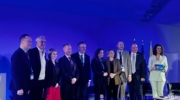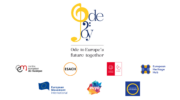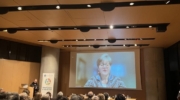Bulgarian Presidency of the EU hosts conference ‘Cultural heritage for a more sustainable Europe’ in Plovdiv
How to achieve the political recognition and support needed for fully exploiting the potential of cultural heritage at EU level? This question inspired the discussions during the conference ‘Cultural heritage for a more sustainable Europe’ on 26-27 March (read concept paper). Organised by the Bulgarian Presidency of the Council of the European Union, the conference took place in Plovdiv, the future European Capital of Culture 2019 and first Bulgarian city to hold this title.
Europa Nostra’s Secretary General Sneška Quaedvlieg-Mihailović contributed to the opening session, besides the Bulgaria’s Deputy Minister of Culture, Amelia Gesheva, EU Commissioner, Tibor Navracsics (read opening statement), MEP Mircea Diaconu representing the European Parliament, and the incoming President of the European Economic and Social Committee, Luca Jahier, to name but a few.
#Culture is on top of Europe’s political agenda. I will present new European Agenda for Culture later this spring to ensure future generations can enjoy the richness & diversity of our history & #culturalheritage #EuropeForCulture #FutureOfEurope pic.twitter.com/MVxCMT0qZu
— Tibor Navracsics (@TNavracsicsEU) March 26, 2018
Speaking on behalf of Europe’s civil society committed to cultural heritage represented by Europa Nostra and other members of the European Heritage Alliance 3.3, Sneška Quaedvlieg-Mihailović placed the debate in the wider context of the future of Europe and recent policy developments. Setting the ambitions high, she shared her hopes with the audience for “special conclusions on cultural heritage during the European Council meeting that will take place on 28-29 June, only one week after the European Cultural Heritage Summit in Berlin”, which would be a strong acknowledgement of the central role of culture and cultural heritage for the future of the European project. In this context, the Secretary General of Europa Nostra emphasised the need for adopting an ambitious EU Agenda and Action Plan for Cultural Heritage so as to foster the legacy of the European Year of Cultural Heritage 2018.
She also took the opportunity to announce that Europa Nostra had just adopted a statement on ‘Cultural heritage as a key resource for EU’s future cohesion policy’, calling “on the EU institutions and Member States to provide sufficient resources in the next multiannual financial framework for a strong EU Cohesion Policy beyond 2020 and, within that framework, to explicitly recognise cultural heritage as a key driver of sustainable development and social cohesion in Europe.”
After the opening session, conference speakers debated the main challenges of cultural heritage today and discussed policy aspects in thematic sessions, looking at the competences of the EU in the field of heritage; the mainstreaming of heritage across different EU policies; and, last but not least, the participatory governance of cultural heritage. In the final session, speakers shared their views on future perspectives for cultural heritage, including how to move ‘towards a European Action Plan for Cultural Heritage’.
The first conference day ended with the ceremony for the newly selected sites for the European Heritage Label which was co-hosted by EU Commissioner, Tibor Navracsics and Bulgaria’s Deputy Minister of Culture, Amelia Gesheva.
On the occasion of the Plovdiv conference, the Secretary General of Europa Nostra contributed on 27 March to a television debate revolving around the conference’s main topic that was broadcast live on Bulgaria’s national TV channel BNT2. Sneška Quaedvlieg-Mihailović also gave an interview about the Buzludzha Monument in Bulgaria, listed among the 7 Most Endangered heritage sites in Europe for 2018, to the national TV channel BNT, which was broadcast on 30 March.







